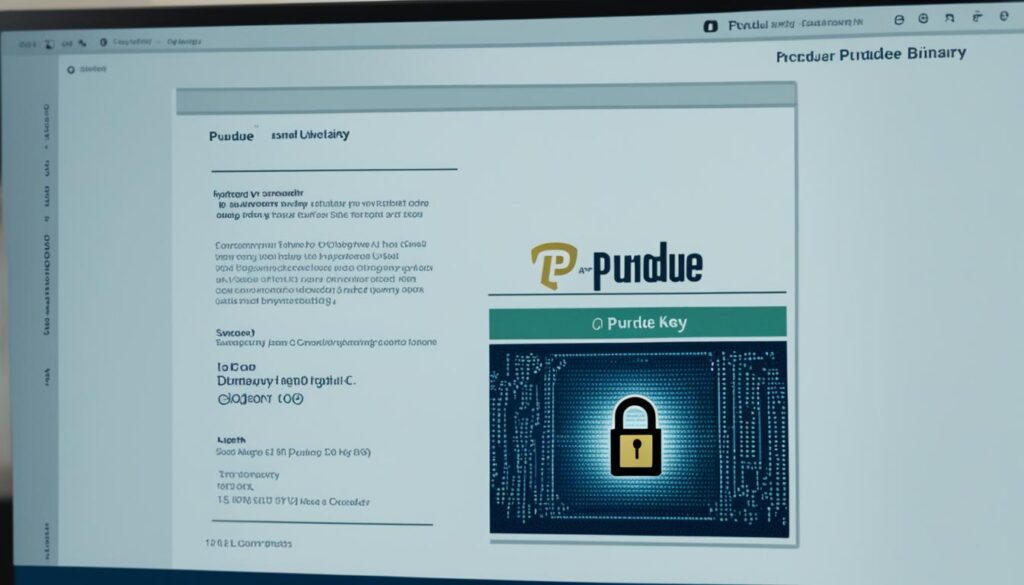In a world filled with cyber threats, Purdue University’s cybersecurity program shines bright. It’s ranked No. 6 in the U.S. News & World Report survey from September1. With a big need for skilled cybersecurity pros, Purdue is key in training the next cyber heroes. It offers top-notch degrees in cybersecurity for fields like finance and health care, where security is crucial1.
Purdue’s program teaches important skills like cloud security and digital forensics. It mixes secure coding, cryptography, and digital forensics for a full learning experience2.
Overview of Purdue University’s Cybersecurity Program
Purdue’s cybersecurity program offers a wide range of learning chances. It focuses on protecting data and networks and prepares students for new tech like quantum computing and AI1. Since 1999, Purdue Polytechnic has led in cybersecurity education. It combines theory with real-world practice12.
Key Takeaways
- Purdue University is known for making graduates ready for cybersecurity jobs in a top-ranked program.
- The program meets the big need for cybersecurity experts in a world facing more threats.
- Students learn about secure coding, cryptography, and digital forensics.
- The University takes a full learning approach, mixing thinking and doing.
- Graduates are ready to solve big cybersecurity problems in important areas like finance and health care.
- Purdue keeps its cybersecurity degrees up-to-date with new tech.
Overview of Purdue University’s Cybersecurity Program
Welcome to a look at Purdue University’s top cybersecurity program. It blends cyber operations programs with real-world skills. If you’re looking at cyber security majors, it’s key to know what makes a program great.
Purdue gives a full education in cybersecurity. It aims to train skilled cybersecurity pros. Students get both theory and hands-on learning. Check out other top schools for great information security programs.
At Purdue, information security programs are in the Purdue Polytechnic Institute. This means students work on team projects that are like real-world challenges. They learn by doing, not just reading.
| Program | Credit Hours | Cost |
|---|---|---|
| Bachelor of Science in Cybersecurity | 180 Quarter Credit Hours3 | Details not available |
| Associate of Applied Science in Cybersecurity/Information Assurance | 60 Credit Hours4 | $10,2044 |
Kathryn Seigfried-Spellar is a key teacher here. She brings cyberforensics expertise and helps students with their projects2.
Purdue is a top school for cyber defense, recognized by the NSA and Homeland Security3. This shows how strong Purdue’s cyber security majors are. They meet what the industry needs.
If you want a program with strong academics and real-world skills, check out Purdue’s cyber programs. Get ready to learn a lot about cybersecurity and be ready for the challenges ahead.
Does Purdue have a cyber security program
Are you looking for the right place for your cyber security education? Yes, Purdue University has a great cyber security program. They offer top-notch online cyber security programs and network security degrees. It’s a top choice for those looking to study cyber security.
The Need for Qualified Cybersecurity Professionals
The digital world brings both big chances and big risks. There’s a big need for skilled cyber security experts. Purdue’s computer science with cyber security program prepares students for this need. It offers small classes for a personal learning experience5.
Curriculum and Holistic Approach
Purdue University goes deep into cyber security. It covers digital forensics and cyber operations with a strong theory base. Students learn about secure coding, cryptography, and more. They start with basic courses and move to advanced ones like incident response6.
Hands-On Experience and Industry Partnerships
Purdue’s cyber security students get real-world experience through projects and internships. They learn from experts and work with businesses thanks to strong partnerships. This hands-on learning is key to solving real-world problems.

Want to know more about Purdue’s cyber security education? Check out their Purdue University Cyber Security page for details on enrollment.
| Program Feature | Details |
|---|---|
| Total Number of Cybersecurity Courses | 68 |
| Introductory Courses | 2 |
| Advanced Cybersecurity Courses | 6 |
| Percentage of Cybersecurity Curriculum | 3% |
| Focus Areas | Coding Security, Critical Infrastructure Security, Incident Response, Vulnerability Analysis |
Purdue’s education and real-world experience prepare students for the cyber security field. They’re ready to face new challenges. Purdue is leading the way in cyber security education56.
Specialized Areas of Study in Cybersecurity
If you’re starting in cybersecurity or want to specialize, Purdue’s Bachelor of Science in Cybersecurity has many paths. You can learn about digital forensics programs and network security degrees. This prepares you for the digital age challenges.
Purdue’s online cyber security programs let you pick areas that match your goals. You can focus on CISSP Certification Preparation, Cloud Computing, or Programming and Analytics. This makes your education fit your needs.
| Concentration | Credit Hours | Key Focus Area |
|---|---|---|
| CISSP Certification Preparation | 16 | Security Policies and Management |
| Cloud Computing | 28 | Virtual Systems Security |
| Data Management | 21 | Information Assurance |
| Game Development | 25 | Secure Game Design |
| Programming and Analytics | 15 | Software Security Analysis |
These concentrations give you deep knowledge in areas like cloud computing. With up to 28 credits in complex subjects, they boost your skills. This makes you more employable and ready for industry challenges3.

If you’re into cyberdefence and tech, check out Purdue’s network security degrees. The program is recognized by the NSA and Department of Homeland Security. It teaches you to protect important services and stay ahead in cyber security3.
Purdue’s program is great for those interested in digital forensics or network security. It mixes academic learning with real-world skills. This prepares you to defend digital spaces in our connected world.
Faculty Expertise and Industry Impact
Purdue University cyber security is growing fast. Faculty like Associate Professor Kathryn Seigfried-Spellar play a big role. She makes big changes in cyberforensics. She helps make cybersecurity degrees better and changes cyber operations programs.
Kathryn Seigfried-Spellar’s Contributions to Cyberforensics
Kathryn Seigfried-Spellar is a big name in cyber security. She uses her knowledge to help Purdue’s cyber security students and the whole industry. She made the File Toolkit for Selective Analysis & Reconstruction (TSAR) for big networks. This tool helps show digital evidence in real time7.
Her work helps law enforcement a lot. It shows how research can help in real life.
Real-World Applications in the Classroom
Purdue’s info security programs are special because they use real-world examples. Students learn by doing projects that mix theory with real tasks. This helps them solve today’s and tomorrow’s cyber challenges7.

At the Polytechnic Institute, they focus on making things happen with hands-on labs and projects. This way, students learn by doing. It helps them solve problems and make a big impact in areas like public safety and sustainable infrastructure8.
| Area of Impact | Faculty Leadership | Program Contributions |
|---|---|---|
| Cyber Operations Programs | Eric Matson, Miad Faezipour | Enhancing first responder safety with UAV and gas sensor technology7. |
| Transportation and Safety | Baijian Yang, Shanyue Guan | Integrating AI and IoT for sustainable infrastructure management8. |
| Digital Forensics | Kathryn Seigfried-Spellar | Creation of File TSAR for law enforcement applications7. |
Purdue University mixes industry experience with learning in a special way. This makes its cybersecurity degrees stand out. Students learn skills for now and the future. They’re ready to apply what they know in their jobs.
Admissions and Transfer Information for Aspiring Students
Starting your journey in Purdue University cyber security means meeting some basic requirements. You’ll find support to help you do well. Purdue University offers great options, both online and on-campus.
Transfer Criteria and Minimum Requirements
Want to join top network security degrees or digital forensics programs? You need to know how to transfer and what grades you must have. You must have a 3.2 GPA and know coding and college-level calculus well. You should get at least a B- in these subjects3.
To get a Bachelor of Science in Cybersecurity, you need 180 quarter credit hours. There are different paths you can take. You can focus on things like getting a CISSP certification, cloud computing, or making software with languages like C# and Python3.
Advising and Support Services
Getting through Purdue University’s cyber security program can be tough. That’s why there are Computer and Information Technology Advisors to help. They make sure you know what you need to do, help you set goals, and show you how to use resources.
These advisors do more than just give advice. They help you work on projects and connect with industry experts. This makes what you learn in class more useful9.

For more help with cyber security education, check out this detailed guide here. It talks about the best tech programs and what skills you need for a great career in this field.
| Program Concentration | Core Courses |
|---|---|
| CISSP Certification Prep | Certified Information Systems Security Professional I, II, III |
| Cloud Computing | Cloud Infrastructure Administration, Cloud Security |
| Data Management | Data Mining and Data Warehousing, Advanced Database Concepts |
| Software Development (C#) | Website Development, Advanced Software Development |
If you’re transferring or starting new, make sure you meet Purdue University’s high standards. This will help you succeed in the changing world of cyber security.
Conclusion
Purdue University is a key place for learning about cybersecurity. With more cyber threats, like the 100,000 in 201510, experts are vital. Purdue offers top-notch degrees that meet the needs of the industry.
Purdue gives you both theory and practical skills in cybersecurity. If you’re into cyber security majors or info security programs, you’ll get what you need. Over 42 students feel safe online but still don’t fully understand cybersecurity10. Purdue’s programs help you face these challenges.
At Purdue, you can focus on areas like secure software or protecting critical infrastructure11. This prepares you for a job in a world with 75.4 billion IoT devices by 202512. You’ll learn to protect complex online spaces.
Looking into Purdue’s Master of Science in Cybersecurity Management shows you’re serious about your future. You’ll learn about secure software and protecting critical infrastructure11. This is key in a job market that values both knowledge and understanding of cybersecurity’s changes12. For more on info security vs cybersecurity, check out this deep dive.
FAQ
What types of cybersecurity degrees does Purdue University offer?
What is the focus of Purdue’s cybersecurity major?
Does Purdue offer hands-on learning opportunities in its cybersecurity program?
Can you specialize in a particular area within Purdue’s cybersecurity program?
Who are some of the notable faculty in Purdue’s cybersecurity program?
What are the requirements for transferring into Purdue’s cybersecurity program?
Does Purdue University have support services for cybersecurity students?
How does Purdue’s cybersecurity curriculum stay relevant to industry demands?
What makes Purdue’s approach to cybersecurity education unique?
Are there opportunities for cybersecurity students to work on projects with real-world impact?
Source Links
- Cybersecurity program among the nation’s strongest, drawing best and brightest undergrads to careers in highly demanded field – https://www.purdue.edu/newsroom/purduetoday/releases/2024/Q2/cybersecurity-program-among-the-nations-strongest-drawing-best-and-brightest-undergrads-to-careers-in-highly-demanded-field.html
- Cybersecurity – Undergraduate Admissions – Purdue University – https://www.admissions.purdue.edu/majors/a-to-z/cybersecurity.php
- Bachelor of Science in Cybersecurity < Purdue University Global – https://catalog.purdueglobal.edu/undergraduate/business-information-technology/cybersecurity-bs/
- Cybersecurity / Information Assurance – Ivy Tech Community College – https://www.ivytech.edu/programs/all-academic-programs/school-of-information-technology/cybersecurity-information-assurance/
- Cybersecurity at Purdue University in Indianapolis – https://polytechnic.purdue.edu/purdue-in-indianapolis/degrees/cybersecurity
- Courses for Cybersecurity – https://polytechnic.purdue.edu/degrees/cybersecurity/courses
- “Holistic Safety & Security” research focuses on critical infrastructure, cybersecurity – https://polytechnic.purdue.edu/newsroom/holistic-safety-security-research-focuses-critical-infrastructure-cybersecurity
- Interdisciplinary Faculty – Purdue Polytechnic Institute – https://polytechnic.purdue.edu/office-of-research/impact-areas/holistic-safety-and-security/interdisciplinary-faculty
- Purdue Engineering Professional Courses – https://engineering.purdue.edu/online/digital-badges/professional-courses
- Purdue University Students’ Perceptions of Cybersecurity – https://docs.lib.purdue.edu/cgi/viewcontent.cgi?article=1002&context=ajrsa
- Master of Science in Cybersecurity Management < Purdue University Global – https://catalog.purdueglobal.edu/graduate/business-information-technology/cybersecurity-management-ms/
- Threats – Secure Purdue – Purdue University – https://www.purdue.edu/securepurdue/Cybersecurity/content.php
